Right now, children all over the country are home from school, doing what I’ve seen people call “homeschooling.” It really would be better described as “doing school at home,” and I’ve even seen the term “crisis schooling” used, since it varies significantly from most typical homeschoolers’ experiences—and that of the parents, as well. With kids home from school during the COVID-19 crisis, many friends are reporting that their elementary school children are in front of the laptop from 9–3, with their progress monitored by the school throughout the day, or the amount of work that is emailed to the parents at the start of the week is overwhelming. Parents on my Facebook timeline are overwhelmed and wonder how homeschoolers do it.
Here’s the thing: they don’t. At least not like this. Of all the homeschoolers and unschoolers I know, none of them have a school day that is 9–3 or anything remotely like that. They don’t do every subject every day, and they usually only spend a couple hours on “lessons.” The rest of the day is exploration, self-directed study or play, or projects. Prior to COVID-19, all the homeschoolers I know went on field trips, they took dance or sports lessons, they went to the library several times a week, and had meetups with other homeschoolers.
Homeschooling and unschooling are different ways of looking at the educational system, and when I first became interested in homeschooling, I read a ton of books about homeschooling on various philosophies of homeschooling and unschooling (and still do, to be honest). I went on Instagram and followed hashtags.
As I’ve written about before in another post about education, although the number of Black homeschoolers in the U.S. has more than doubled in the last 15 years to more than 220,000 people, the literature is overwhelmingly white. It’s also very much dominated by a certain socioeconomic status—after all, if both parents have to work full-time at traditional jobs, it’s hard to also homeschool. It’s challenging to homeschool if you’re a single parent. If your child has learning disabilities or certain needs that require additional support or therapies, it’s hard to homeschool. I did find a lot of diverse homeschoolers on Instagram: @amuslimhomeschool, @liberated_homescholars, @happymuslimhomeschool, @chederathome, @secularhomeschooler, and @hiphophomeschoolers, to name a few. I also highly recommend the magazine (in print and web-based) Secular Homeschooler, which always has a diverse contributors list and a variety of articles.
If you’re looking for the best homeschooling books, its basics, or ideas to supplement things you’re doing, or need help with developing a daily routine, you’re in luck! Here’s a list of practical, general, and theoretical books about homeschooling. What I’ve found is this: part of the beauty of homeschooling is that there are so many ways to do it—the way one person does it doesn’t have to be the way you do it. Take what works for you and your family, and leave the rest. (Please note: there are A LOT of books out there that are about faith-based homeschooling. I have not included them. I chose to focus on secular books).
If comics or graphic novels are more your thing, check out this post, too!
Remember: you are doing great. Really.
7 of the Best Homeschooling Books
The Brave Learner: Finding Everyday Magic in Homeschool, Learning, and Life by Julie Bogart
When I first started learning about homeschooling and asked about books in various homeschool Facebook groups, this was the book that kept being recommended over and over. Bogart realizes that parents have their own careers, they have doubts about their ability to homeschool, and can be overwhelmed at the process. She makes homeschooling easy and accessible, and even, dare I say, fun. There are lots of practical ideas in this book and it’s a great way to ease into homeschooling—even if you’re just thinking about it or need something for the time being, this is a gentle guidebook that is also reassuring to parents.
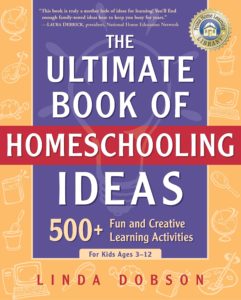 The Ultimate Book of Homeschooling Ideas: 500+ Fun and Creative Learning Activities For Kids Ages 3–12 by Linda Dobson
The Ultimate Book of Homeschooling Ideas: 500+ Fun and Creative Learning Activities For Kids Ages 3–12 by Linda Dobson
If you’re looking for activities for homeschool lessons or even supplemental activities for your kids in addition to what their school has done, this is the book for you. The activities bring play to schoolwork, and make learning fun. What I like about it is that the activities are generally inexpensive and they are creative and child-centered, and easy to do without making it obvious that it’s “schoolwork.”
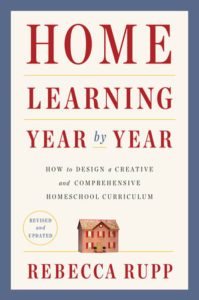 Home Learning Year by Year: How to Design a Creative and Comprehensive Homeschool Curriculum by Rebecca Rupp
Home Learning Year by Year: How to Design a Creative and Comprehensive Homeschool Curriculum by Rebecca Rupp
This is a fantastic book that is a good one to pick up if you’re just getting started. A new edition was just published at the beginning of 2020, which makes it even better. Each chapter has resources, books, and websites to check out for more information, and Rupp is reassuring in her instructions on how to develop a homeschool curriculum, schedule, and structure that works for you. From preschool through high school, this book is indispensable.
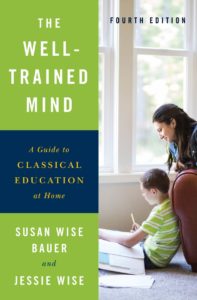 The Well-Trained Mind: A Guide to Classical Education at Home (4th edition) by Susan Wise Bauer and Jessie Wise
The Well-Trained Mind: A Guide to Classical Education at Home (4th edition) by Susan Wise Bauer and Jessie Wise
I first became familiar with Wise Bauer through her book Rethinking School. This book is a wonderful book that provides guidance on how to develop a comprehensive education for your child, from preschool through high school, in all subjects. There are updated curricula, book lists, resource lists—everything you could want, all in one book. The book also addresses questions about standardized testing, kids with learning challenges or disabilities, FAQs about homeschooling, and much more.
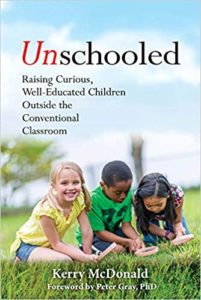 Unschooled: Raising Curious, Well-Educated Children Outside the Conventional Classroom by Kerry McDonald
Unschooled: Raising Curious, Well-Educated Children Outside the Conventional Classroom by Kerry McDonald
If you’ve ever been interested in unschooling, this is the book for you. Unschooling doesn’t mean not educating children—it is another way of approaching education that is self-directed. This book is a reassuring read that not only delves into the history of unschooling, but also practical advice on how it can be implemented and resources on how to incorporate it into your life.
 How Children Learn: 50th Anniversary Edition by John Holt
How Children Learn: 50th Anniversary Edition by John Holt
This is a classic by one of the pioneers of unschooling. It examines how children learn (spoiler alert: they are constantly learning through play, observation, and living) and how we can foster learning in all possible ways. The 50th anniversary has updated notes in it which are really helpful—but much of the original text still rings true today.
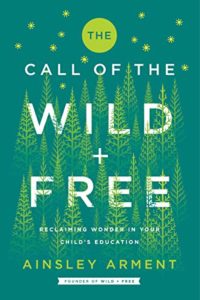 The Call of the Wild+Free: Reclaiming Wonder in Your Child’s Education by Ainsley Arment
The Call of the Wild+Free: Reclaiming Wonder in Your Child’s Education by Ainsley Arment
Arment is the founder of Wild+Free, a homeschooling community. The book has a lot of gorgeous pictures of ideal homeschool setups, but don’t be intimidated—she goes over the basics of homeschooling, different theories of homeschooling, and her family’s story of how and why they decided to homeschool and how they make it work. She talks about homeschooling myths, how to create your own homeschooling routine, and tons more. If you’re curious about homeschooling or wondering if it’s something you might be able to do, this is a low-pressure, easy read that’s also super inspiring.
Source : 7 of the Best Homeschooling Books








